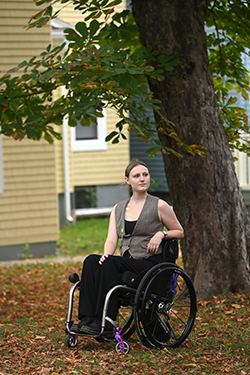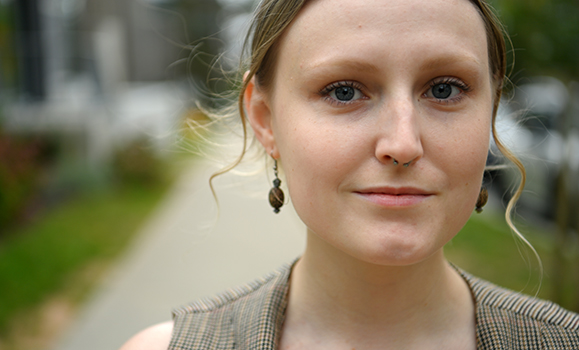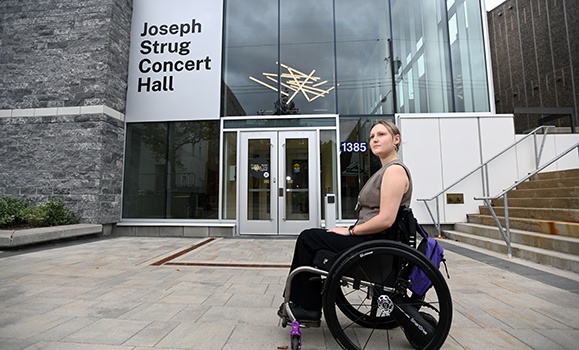Every week, Maeghan Taverner (BA’19) logs on to Zoom to teach dance to students around the world. Her goal, she says, is to ensure each lesson is not only fun, but also as accessible as possible.
“Some of my students are housebound, if not bedbound, so I do seated choreography and find other ways to share dance with them,” explains Taverner, a disabled artist who uses they/them and she/her pronouns. “It’s really cool to see how many people you can reach when you make something accessible."
These classes have been transformative for Taverner’s students and for her. During her third year in Dalhousie’s acting program, she became ill and was subsequently diagnosed with Myalgic Encephalomyelitis, a multi-system disease, and Postural Orthostatic Tachycardia Syndrome, a nervous system disorder with symptoms such as faintness and dizziness. That made it impossible for Taverner to continue participating in performing arts in the way she wanted to.
“It was weird that my life went on pause during COVID-19,” they say. “It ended up working out in a way, because it gave me time to let go of all that and make it through the worst of the worst and the extensive hospital admissions I had. I’m just grateful I’ve been able to find a way back.”
Finding a safe space for expression
 Taverner first became passionate about the performing arts at the age of four when their mother, a former dancer, enrolled them in ballet classes. They continued to explore that passion as a teen through championship Highland dancing, representing the province three times, and high school acting classes.
Taverner first became passionate about the performing arts at the age of four when their mother, a former dancer, enrolled them in ballet classes. They continued to explore that passion as a teen through championship Highland dancing, representing the province three times, and high school acting classes.
“I was always a semi-shy, socially anxious kid, but something about performing opened up the world to me,” Taverner says. “Theatre and dance offered a safe space where I could express myself in ways that I wasn't able to in other settings.”
That sense of freedom led Taverner to the acting program at Dalhousie’s Fountain School of Performing Arts. She chose Dal over a conservatory program because it opened the door to explore academic opportunities both within and beyond performing arts.
“I was always academically driven, so I thought, ‘If I’m not going to be an artist, I could be a professor,’” they say. “It ended up being a great fit for me because I was able to explore both avenues at the same time.”
Reconnecting with a lifelong passion
Taverner opted to do a combined honours degree in theatre and sociology. Those courses helped her navigate her illness. “I learned the structural reasons why our health-care system is failing and how what’s happening to me isn’t my fault,” she says. “If I hadn’t taken those courses, I don’t think I would have been able to cope with getting sick and the thought that I was losing a part of who I was as a person.”
But Taverner eventually found ways to reconnect with her passion. She started taking inclusive online dance classes with the Kate Stanforth Academy of Dance, a UK-based non-profit, and subsequently became one of their teachers. She joined the executive board of Dance Nova Scotia and is using the opportunity to advocate for increased accessibility in dance. And she returned to the theatre in behind-the-scenes roles. In 2023, she served as assistant choreographer for Neptune Theatre’s production of Cinderella and in August 2024 she was the choreographer for Still Dancing, a dramatic comedy that had its world debut at the Ship’s Company Theatre in Parrsboro.
“I’m happy I’ve been able to find my way back to something that was an integral part of my identity,” she says. “It’s not necessarily in the way I envisioned, but it has been wonderful.”
Although managing their health is essentially a full-time job for Taverner, they continue to explore opportunities in dance and theatre and to advocate for more accessibility in these realms and in all aspects of society.
“There is so much creativity and ingenuity in the disability community,” they say. “We just need more opportunities to thrive. We saw some of that happen during the pandemic when the world moved toward radical accessibility. But I feel like we moved backward from that. We should be taking those lessons and running with them and that’s what I am passionate about now.”


